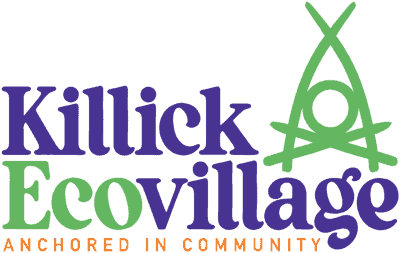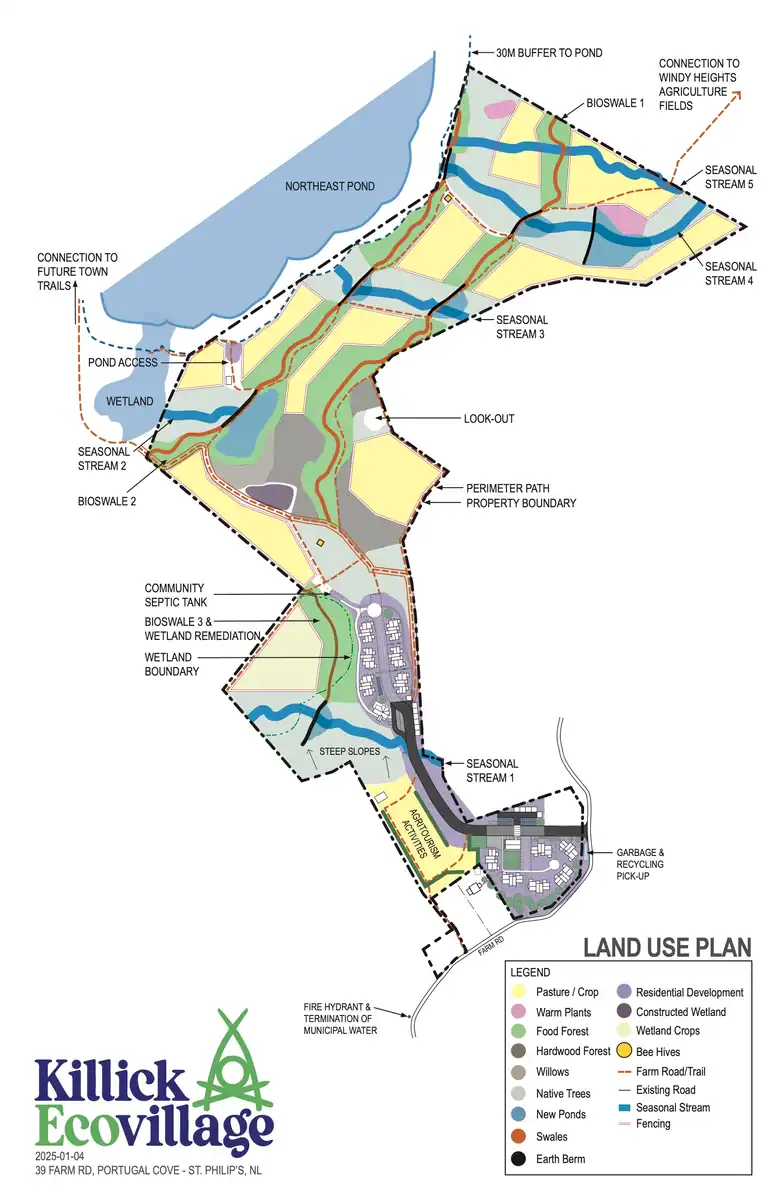Eco Village Frequently Asked Questions
ECOVILLAGE:
A community planned with the environment and sustainable living in mind. Homes are energy efficient, food is grown on-site, shared tools and resources cut down on waste, and the land is managed with permaculture and biodiversity in mind.
Portugal Cove - St. Philips is a small community looking west over an Atlantic Ocean inlet, within biking distance (and walking distance for some) of a post office, fire station, a number of restaurants, a trendy café and garden centre and gas station. It's an easy 17-minute drive to downtown St. John's, capital of Newfoundland and Labrador.
There will be 51 fully self-contained homes ranging from 600 sq ft to 1,400 sq ft. Smaller units suit singles or couples, while larger ones are designed for families. All homes follow universal design principles for accessibility and include options like lofts, patios, or balconies. You will find the floor plans for homes here.
Private homes are intentionally modest in size, balanced by two large Common Houses with coworking space, guest rooms, a kids’ playroom, craft and music rooms, laundry facilities, and a fully equipped community kitchen and dining area.
We have 6 different home layouts, each having a number of different orientations and proximities to the parking area, playground, and common houses, some tucked away and some entering right on the main path to allow a lot of choice in how people interact with community and have their privacy
The 51 units are designed for people of all ages, incomes, cultures and backgrounds. Families, singles, seniors, and people with disabilities are all welcome. Homes range from 600–1,400 sq ft, and the design supports aging in place and universal accessibility.
Instead of traditional mortgages, Killick uses the Mutual Home Ownership Society (MHOS) model. Members invest in the co-op by providing loans, pay an income-based monthly housing charge, and build savings over time. When they leave, their loan is repaid with interest.
Killick Ecovillage is a housing co-operative, so no one owns their own home outright, but collectively everyone owns all of the co-operative’s assets with exclusive access to a home in the community. This is why it is a Mutual Home Ownership Society (MHOS).
Members do not need to find their own private mortgage to live in Killick Ecovillage, but they do need to provide a minimum down payment (currently set at $15,000) unless they qualify for our low income assistance program. The down payment is considered a loan to the co-op, which is repaid when the member leaves, with interest if the member lives in the community for more than 3 years.
Instead of a mortgage payment or rent, members pay a Housing Charge each month that is assessed based on the net (after tax) income of all adult members of their household. This fee will be no more than 35% of household income, and includes two parts.
One part of the fee is the Community Fee, which is the same for everyone and covers all housing-related costs like utilities (electricity, heating/cooling, and water), property taxes, community internet and insurances, access to the community’s food and farm program, and other things that members deem necessary to operate and maintain the homes. Members would be responsible for their own transportation costs and tenant insurance.
Anything left over in the Housing Charge after the Community Fee is paid is taken as a loan from the member to the Co-op. These monthly loans, added to the original down payment amount, are calculated each month until they add up to the value of the home the member occupies (called the Total Obligated Loan that is set based on market values when the member first signs their Lease Agreement). Once a member has contributed this maximum loan amount, their monthly Housing Charge drops to just the Community Fee plus a small administrative charge (currently +10%).
In order to have a lower monthly fee quicker, members can contribute additional loan amounts up to the Total Obligated Loan amount at any time.
Current measurements are the floor space (both floors of the 2-storey) not including loft space. At move the loft space will just have an access ladder and can be used for storage. Modifying them will require approval from the design review sub-circle and all at the leaseholder’s expense. The value added (assessed increase in value of the unit not actual construction costs) will be added to the total obligated loan amount and the same amount acknowledged as a loan contribution that is part of what is repaid when they leave. The current drawings will be revised and specific sizes for each unit included when architecture drawings are complete.
We have committed to holding 16 homes in the community for households making 80% of the Area Median Income (AMI) or less than $72k after taxes per household, and aim to make 5 of those accessible for households making 30% AMI or less, which is around $27k after taxes (if we can get grant funding to make this possible).
We are hoping to have a program that allows us to waive the initial loan requirement for households in the lowest income brackets and can demonstrate that they have no way to raise the minimum initial loan.
If a household faces a short term emergency or loss of income, they can apply to put their lease agreement on hold and move to a short term landlord-tenant affordable rental agreement.
We will be setting up a separate Community Fund that will allows us to support members through emergencies, unexpected life changes, and other life surprises.
Charges are re-assessed annually based on household income. If you experience a sudden change (job loss, new baby, retirement), you can request a mid-year re-assessment. The goal is to keep housing affordable for all members in real time, not just on paper.
If you move out, the Co-op is obligated to repay your loan, with added interest if you live in the community for more than 3 years, minus any unpaid fees and the cost required to bring the home back up to a like-new move-in status, including updated fixtures if needed.
To keep finances stable, we anticipate no more than 3 households can withdraw their loan in a given year, though they can sub-let or leave but forego loan repayment until the following year. Members are required to give at least three months’ notice. A new member moving in helps cover repayment, so the system stays sustainable.
Repayment might be done as a lump sum or as a repayment plan signed by both the leaving member and the co-op; designed to ensure the co-op remains financially sustainable.
Some of the loans will be invested so that the money is available to repay members when they leave.
The new member’s minimum initial loan and any additional loans contributed will help pay a leaving member.
While there are many opportunities to connect with neighbours, there is no requirement to do so. Each home is a self-sufficient dwelling, and privacy is respected.
There are two common houses (one in each housing cluster) for a total of 6000 square feet of shared spaces for fitness, yoga, music, co-working, children & teen rooms, library, and just hanging out with friends of all ages.
Group meals will be prepared 5 nights a week for those interested, with much of the food coming from our own farm where members are welcomed (but not obligated) to help out. Shared outdoor space includes gardens, children's play space, walking paths, and ponds for fishing, swimming and skating.
As in any community, residents will naturally be closer to some than others. However, our members all expect and deserve to be treated with respect, which fosters a healthy community.
We know and expect conflict will happen – this is not a utopian neighbourhood – but instead of letting things fester and turn divisive and unliveable, we deal with issues head on through an intentional process and effective communication.
To promote healthy interactions, we created these Community Agreements:
1. We will try to be equitable and inclusive
2. We will work hard at social cohesion (getting along + helping each other)
3. We aim to do better (for society + for the environment + towards decolonization)
4. We will try to be open to learning and sharing, creating space for all voices
5. We will try to keep ourselves and each other safe physically, emotionally, and socially
6. We will try hard to be empathetic, listening and believing each other’s needs and experiences
7. We will intentionally build the culture we want: fun, stress-free, friendly
8. We will always try to do our best and recognize that is different for everyone
Killick Ecovillage Cooperative is a registered non-profit housing co-operative.
Like many cohousing communities, we use sociocracy (aka: dynamic governance) for our governance structure and decision-making. Sociocracy avoids majority-rule division through a participatory, consent-based process that distributes power non-hierarchically among members.

